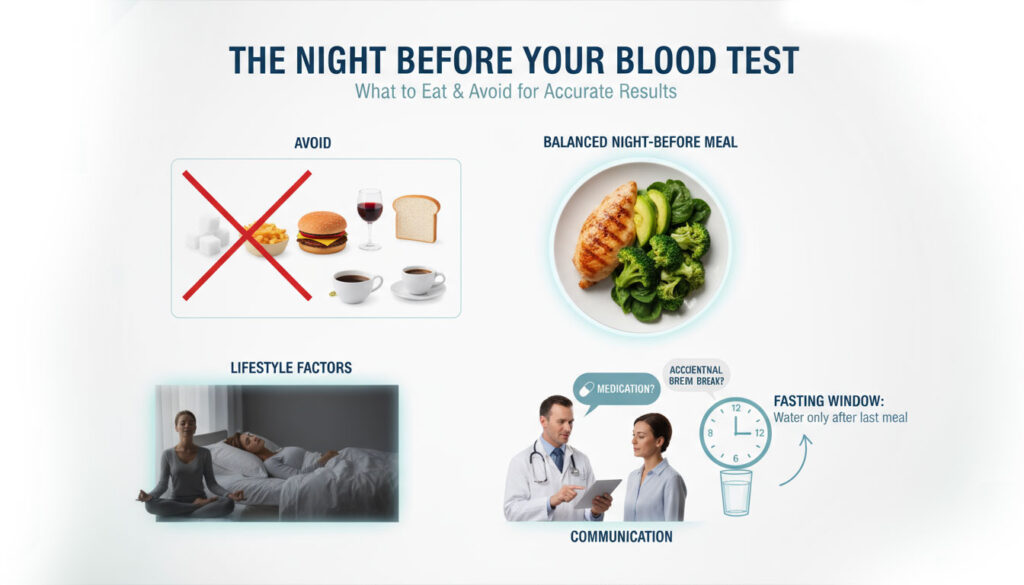There is a unique stillness in the moment you receive a lab order form from your doctor. It represents a critical snapshot of your health, and the instructions often seem simple enough, especially the part that says “fast for 8 to 12 hours.” But what happens in the hours before that fast begins?
Table of Contents
The meal you eat the night before is a powerful, often overlooked variable that can significantly influence your results, potentially leading to an inaccurate diagnosis, unnecessary follow-up tests, and a great deal of anxiety. Proper blood sugar test preparation is your first step toward clarity.
To ensure your test provides a true reading, it is crucial to avoid sugary foods, refined carbs, high-fat meals, alcohol, and caffeine. These specific foods to avoid before a blood sugar test can artificially raise glucose and lipids in your bloodstream, skewing the very numbers you need to be accurate. Instead, the ideal night before blood glucose test meal is a balanced one, built around lean protein, non-starchy vegetables, and fiber to maintain stability.
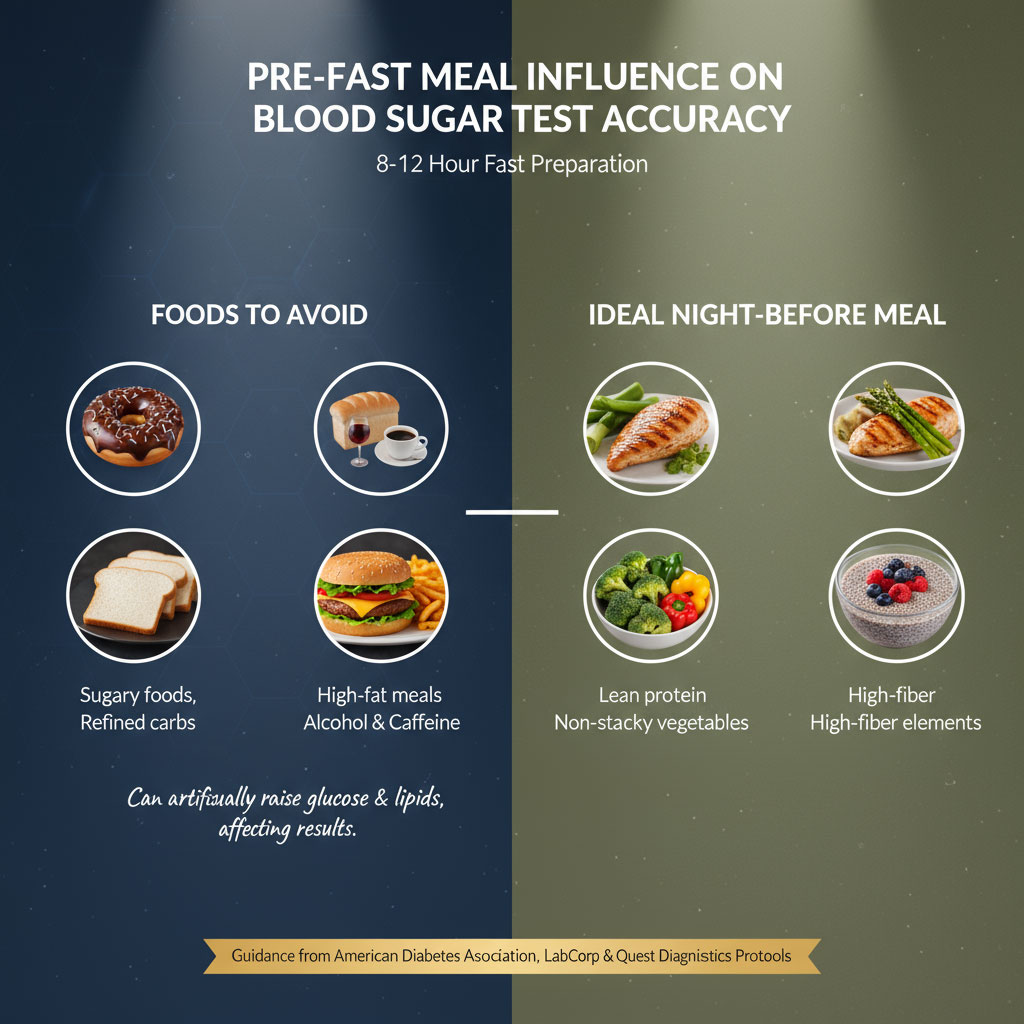
This guide provides a definitive look at what not to eat, drawing upon guidelines from leading health authorities like the American Diabetes Association (ADA) and standard protocols from major US diagnostic labs, including LabCorp and Quest Diagnostics.
The Science of a “True Fast”: Why Your Last Meal is a Critical Data Point
Understanding the “why” behind pre-test dietary instructions can transform them from a set of rules into a strategy for accurate results. A fasting blood test is not just about having an empty stomach; it is about allowing your body to return to a true metabolic baseline.
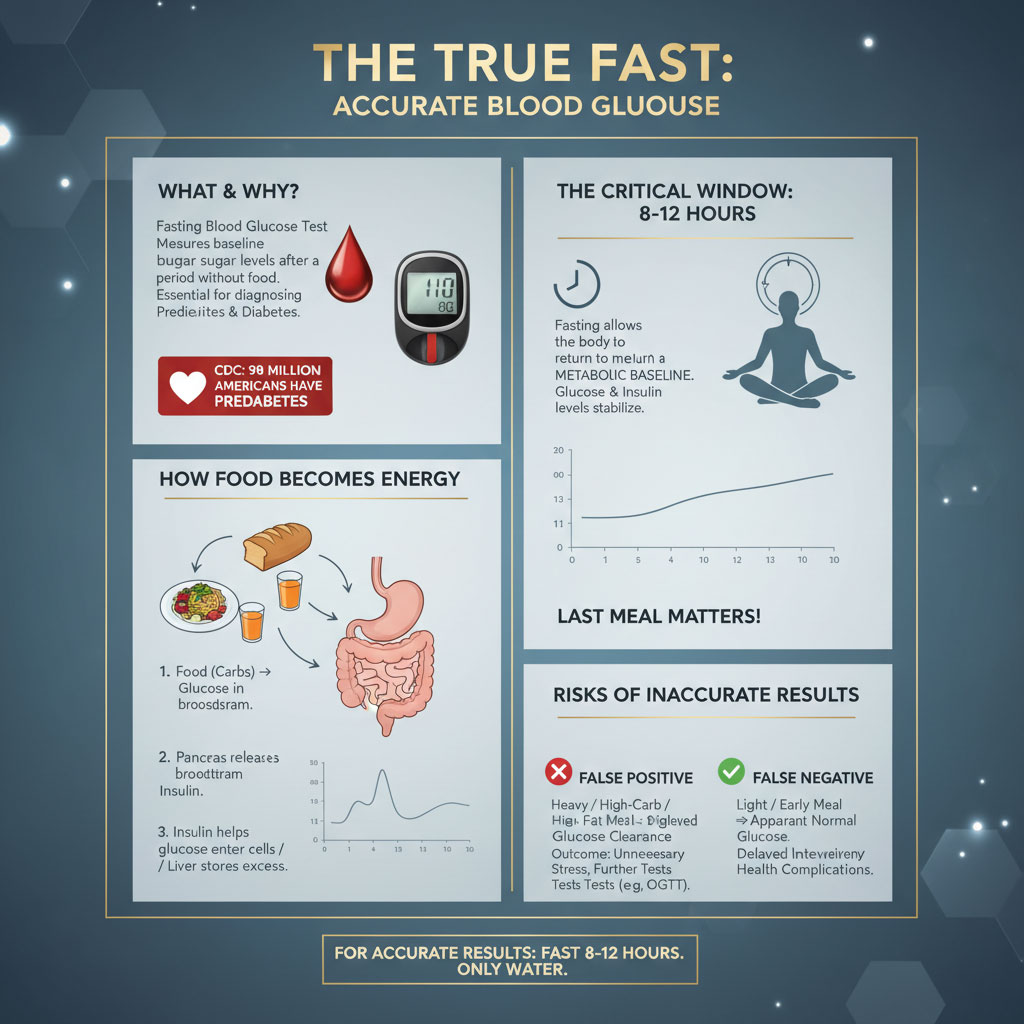
What is a Fasting Blood Glucose Test?
A fasting blood glucose test measures the amount of sugar, or glucose, in your blood after a period of not eating, typically 8 to 12 hours. This simple blood draw is a primary tool used by healthcare providers to screen for insulin resistance, prediabetes, and type 2 diabetes.
Given that the Centers for Disease Control and Prevention (CDC) reports that approximately 98 million American adults have prediabetes, the importance of an accurate screening cannot be overstated. This test serves as an essential early warning system, making proper blood sugar test preparation a non-negotiable part of the process.
How Your Body Processes Food Overnight: The Metabolic Story
When you eat, your body breaks down carbohydrates into glucose, which enters your bloodstream. This triggers your pancreas to release insulin, a hormone that helps your cells use this glucose for energy. Any excess glucose is stored in your liver for later use.
A large, high-carbohydrate, or high-fat meal can keep these systems working overtime for many hours. This prevents your body from reaching a true resting state, which is precisely what the fasting test is designed to measure. This is a key reason why understanding the list of foods to avoid before a blood sugar test is so vital.
The High Stakes of an Inaccurate Result
An incorrectly elevated blood sugar reading can lead to a cascade of consequences. It might result in a false positive diagnosis, causing significant stress and prompting more extensive and costly tests, like the oral glucose tolerance test (OGTT).
Conversely, if certain foods or drinks artificially lower your blood sugar, you could receive a false negative. This might delay crucial lifestyle interventions or necessary medical treatment. The goal is to eliminate variables, and your last meal is the biggest one you can control.
The Definitive “Do Not Eat” List: 7 Categories to Avoid Before a Blood Sugar Test
To achieve an accurate fasting state, it is essential to be mindful of what you consume in your final meal. The following are the most important fasting blood sugar test foods to avoid.
1. Sugary Foods & Refined Carbohydrates: The Obvious Spikers
This is the most critical category of what not to eat before fasting blood sugar test. These foods are digested very quickly and cause a rapid surge of glucose into your bloodstream, forcing a strong insulin response that can linger for hours.
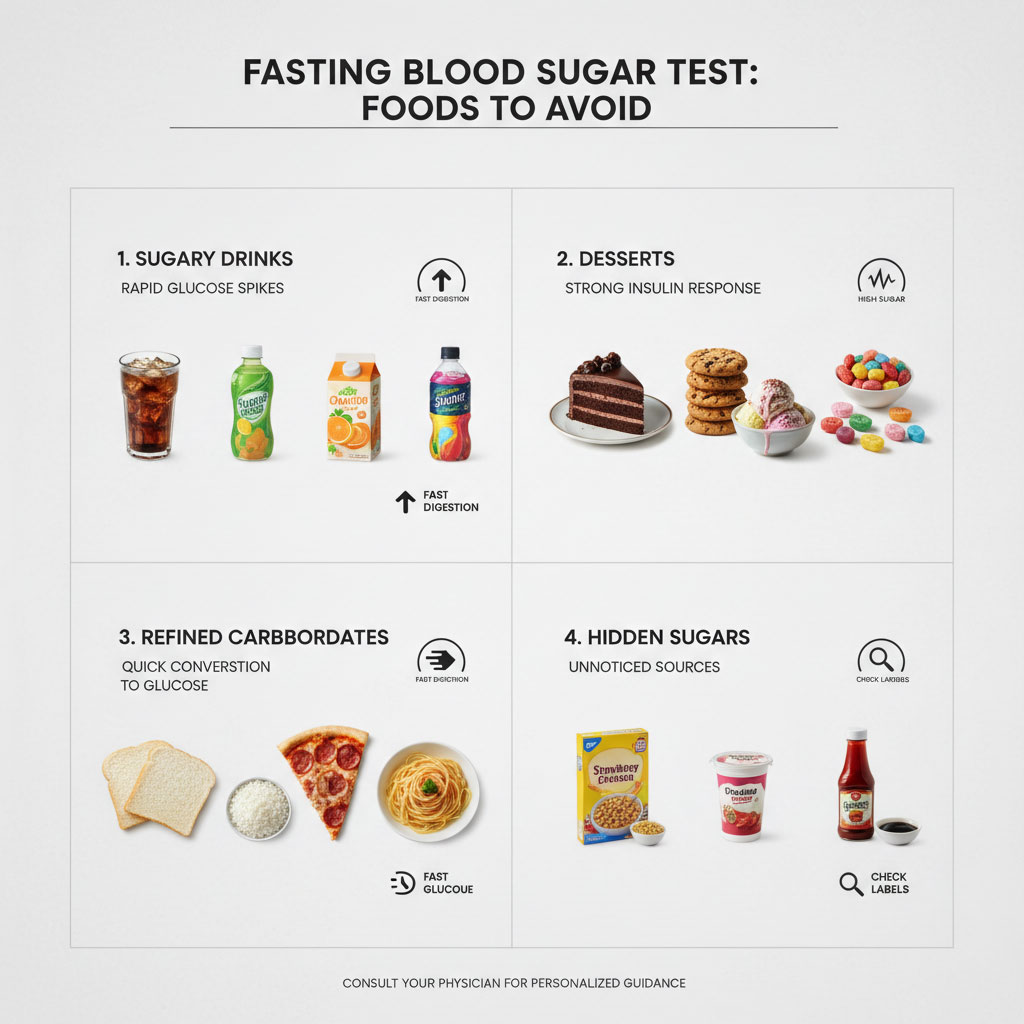
- Avoid: Sodas, fruit juices, sweetened teas, and sports drinks.
- Avoid: Desserts like cakes, cookies, ice cream, and candy.
- Avoid: Refined carbohydrates such as white bread, white rice, pizza, and most pasta.
- Avoid: Foods with hidden sugars, including many breakfast cereals, flavored yogurts, and sauces like ketchup or teriyaki.
2. High-Fat & Fried Meals: The Hidden Disruptor of Lab Accuracy
While these foods may not be pure sugar, they present a different but equally serious problem for lab testing. A heavy, fatty meal can cause a condition known as lipemia.
Lipemia occurs when high levels of fats, particularly triglycerides, remain in the bloodstream, making the blood serum appear milky or cloudy. This turbidity can physically interfere with the light-based technology used by laboratory machines to measure glucose, leading to a rejected sample or an inaccurate reading. This is a primary reason why fast food and fried items are on the list of foods to avoid before a blood sugar test.
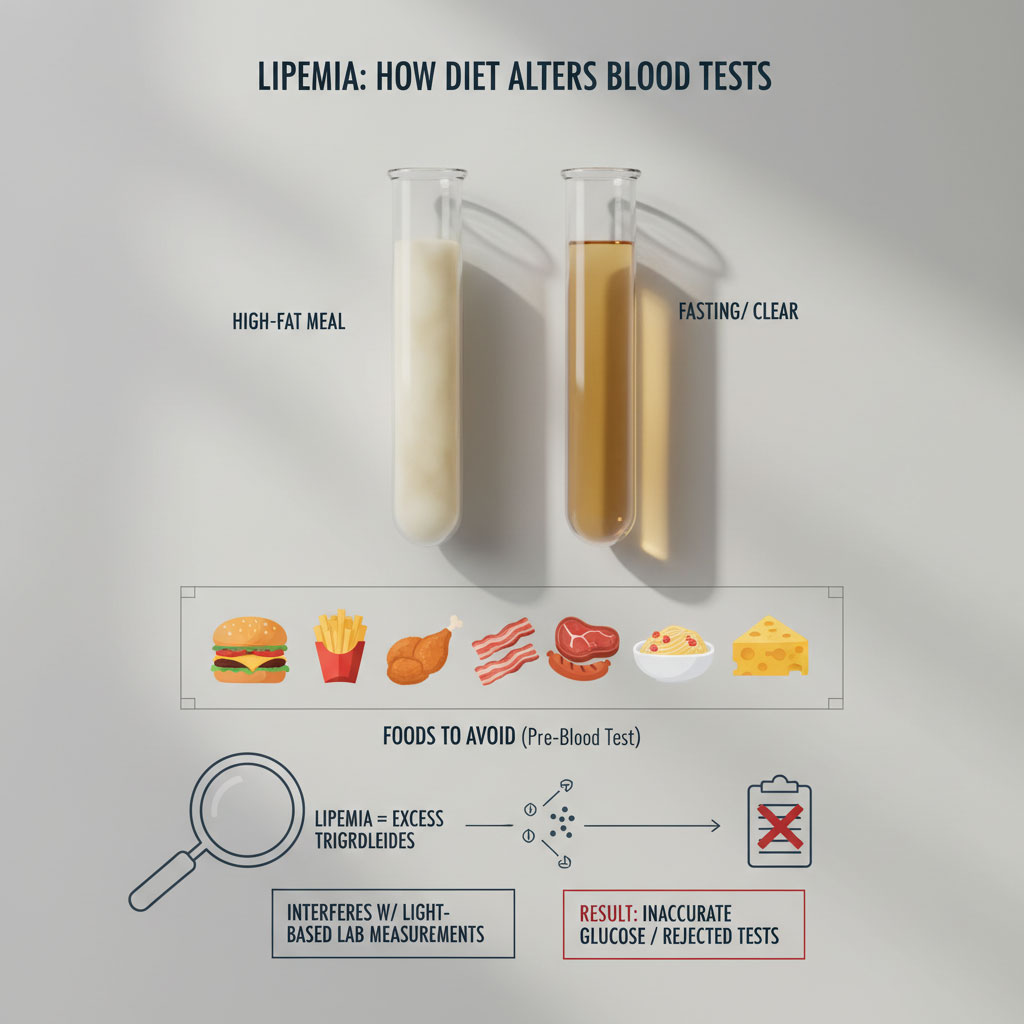
- Avoid: Fast food like burgers, french fries, and fried chicken.
- Avoid: Fatty cuts of red meat, bacon, and sausage.
- Avoid: Dishes with creamy sauces, heavy gravies, or excessive cheese.
3. Alcohol: The Unpredictable Variable for Your Liver
The impact of alcohol and blood sugar test results can be unpredictable and significant. Alcohol consumption can interfere with your liver’s normal function of releasing stored glucose, which could, in some cases, lead to lower-than-expected blood sugar in a fasted state.
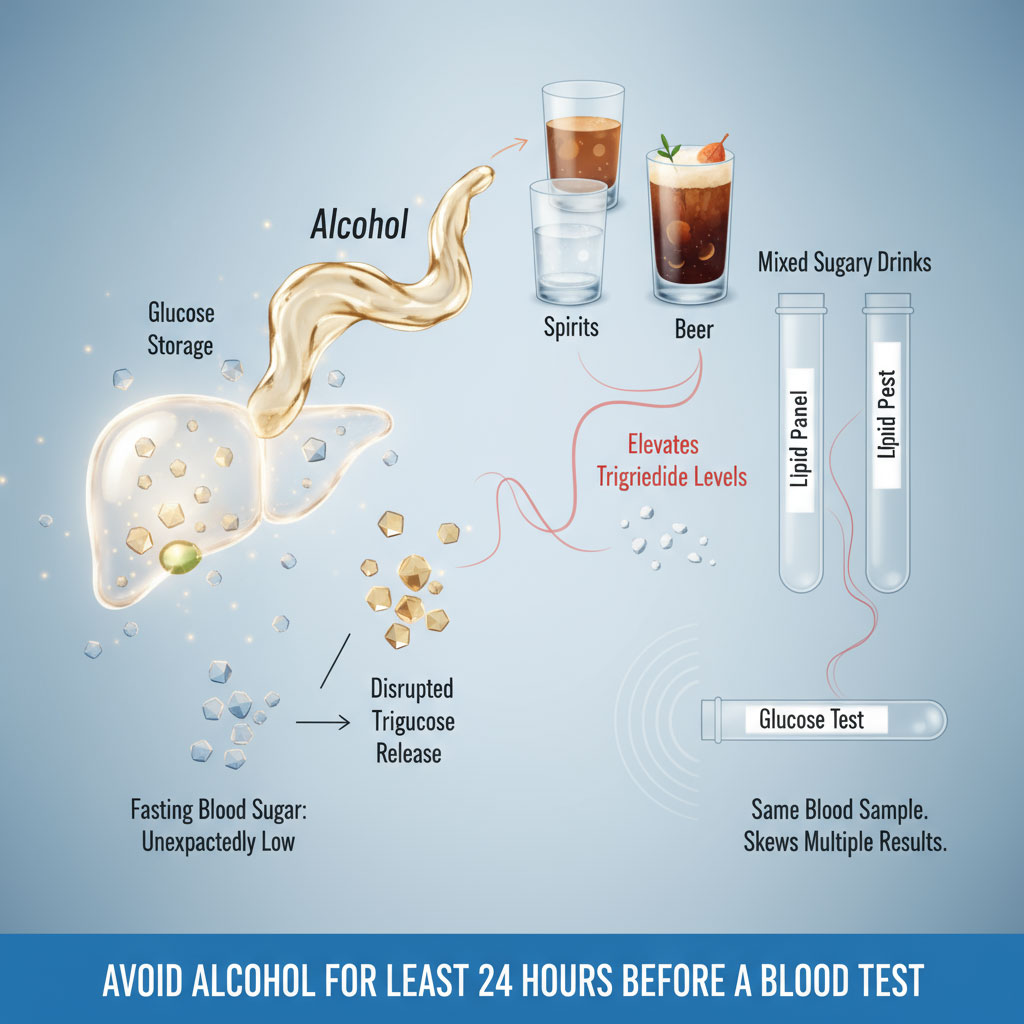
More commonly, alcohol, especially when mixed with sugary drinks, can raise triglyceride levels. Since lipid panels are often performed with the same blood sample as a glucose test, this can skew multiple results at once. It is best to avoid all alcohol for at least 24 hours before your test.
4. Caffeinated Beverages: Beyond Just Black Coffee
Many people assume black coffee is fine during a fast, but caffeine before blood sugar test should be avoided. Caffeine is a stimulant that can trigger the release of hormones like cortisol.
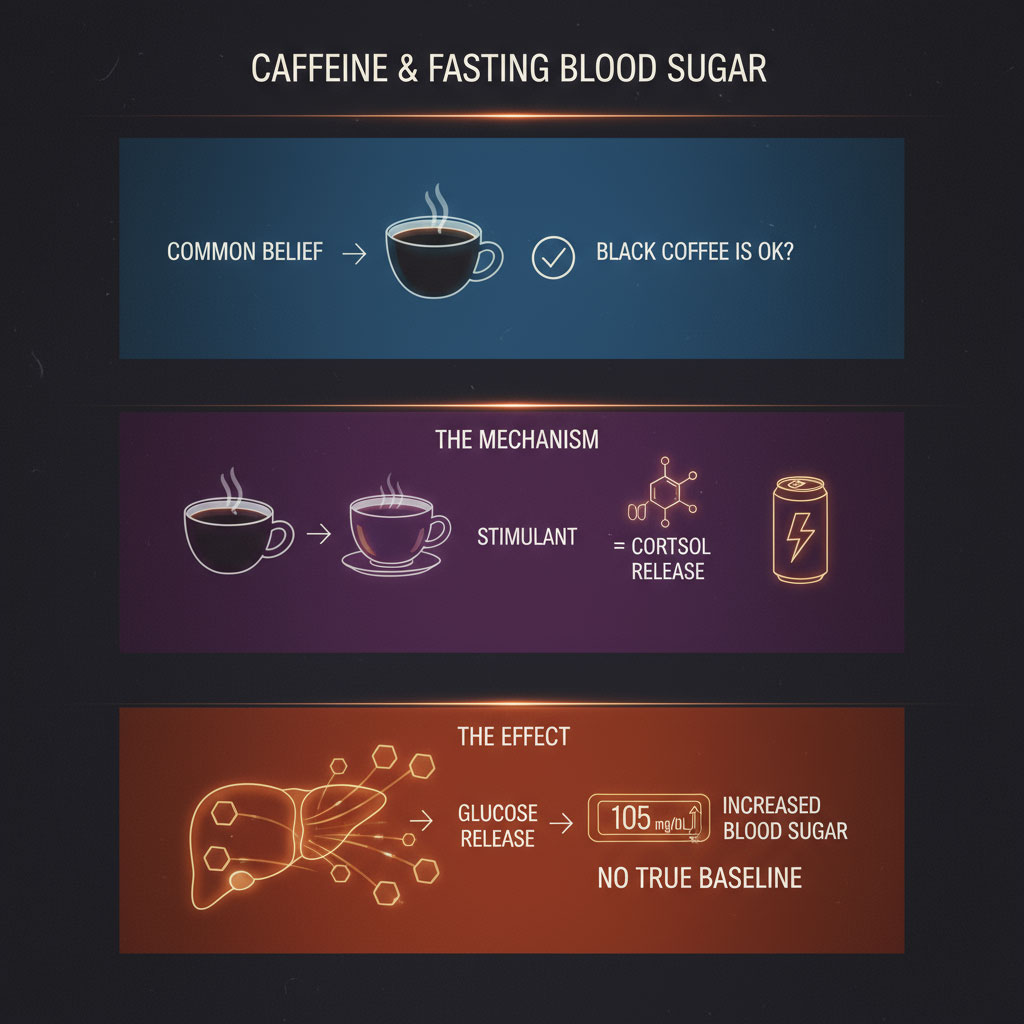
These hormones can signal your liver to release some of its stored glucose into the bloodstream to prepare your body for action. This can cause a modest but meaningful increase in your fasting blood sugar, preventing a true baseline reading. This applies to all sources of caffeine, including coffee, tea, and energy drinks.
5. Gum, Mints, and “Zero-Calorie” Drinks
This is a common point of confusion. Even if something has zero calories, it might still affect your test. The sweet taste of sugar-free gum, mints, or diet sodas can sometimes trigger what is known as a “cephalic phase insulin response.”
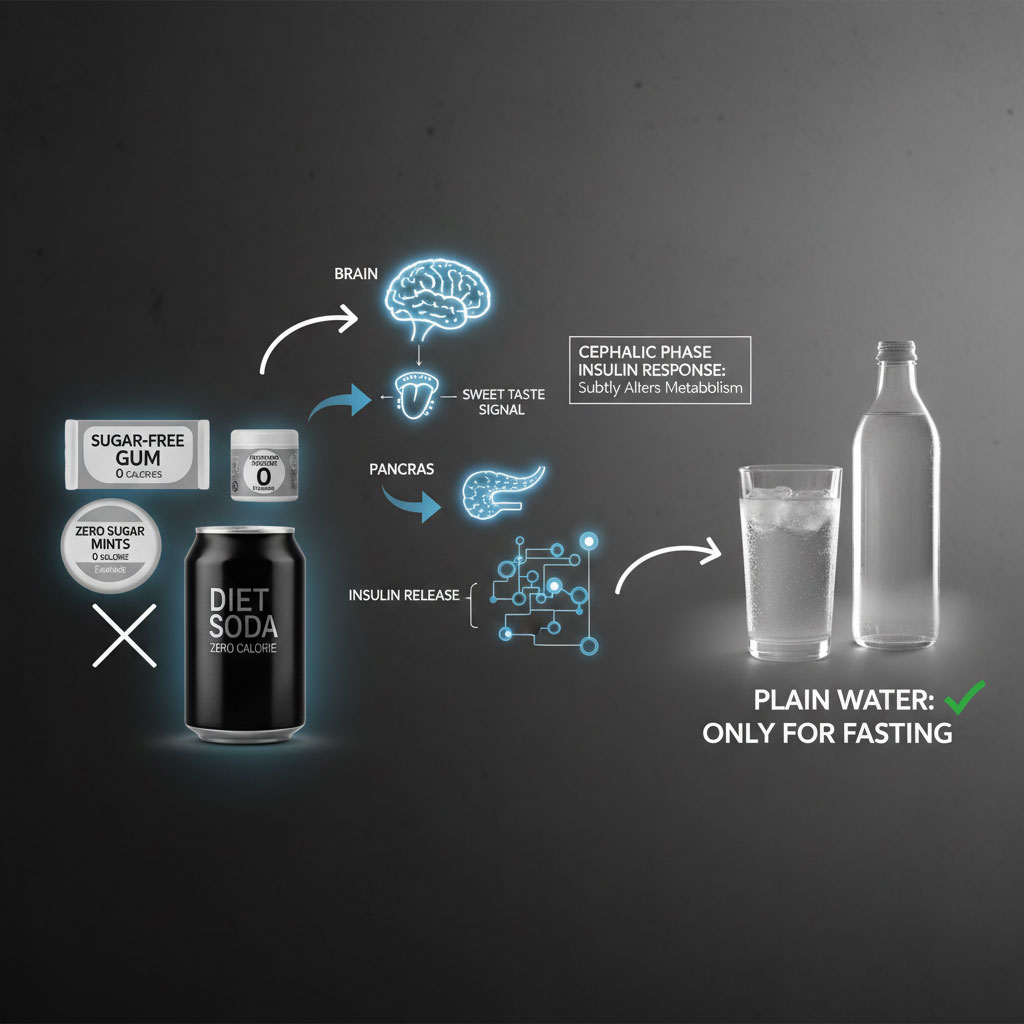
This is where your brain anticipates sugar and tells your pancreas to release a small amount of insulin, which can slightly alter your metabolism. To be safe, the only liquid you should consume during your fast is plain water.
6. Excessive Portions of Even “Healthy” Foods
Volume matters. A very large meal, even if it is composed of healthy foods, takes a long time for your body to digest and process. This prolonged digestive state can impact your fasting levels. A sensible portion size is a key component of a good night before blood glucose test meal.
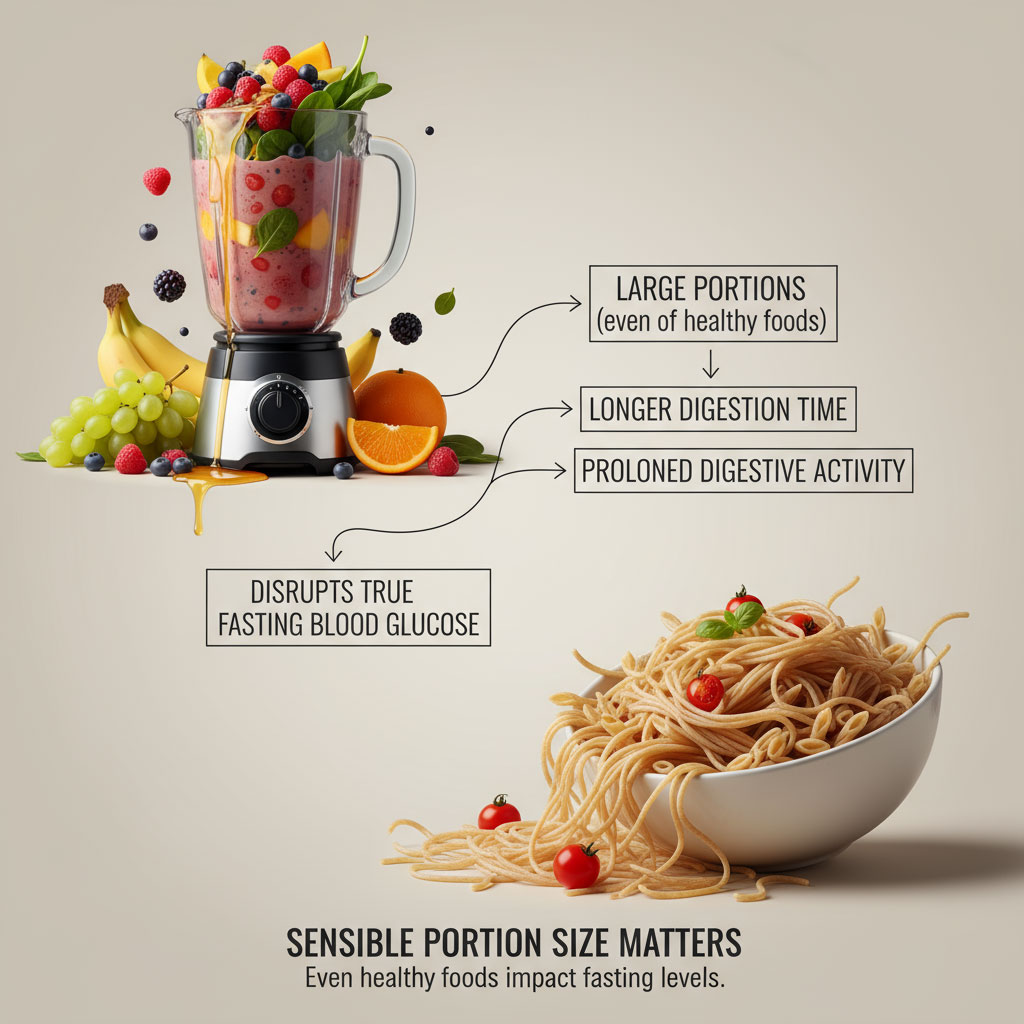
Think about a giant fruit smoothie, which contains a large amount of natural sugar, or an oversized bowl of whole-wheat pasta. While healthy in moderation, these large quantities can disrupt a true fast. This is a subtle but important part of understanding what to eat night before blood sugar test.
7. Heavily Processed & High-Sodium Foods
Ultra-processed foods and those high in sodium can also pose a problem. High sodium intake can lead to water retention and may have minor effects on hormones that regulate blood pressure and glucose.
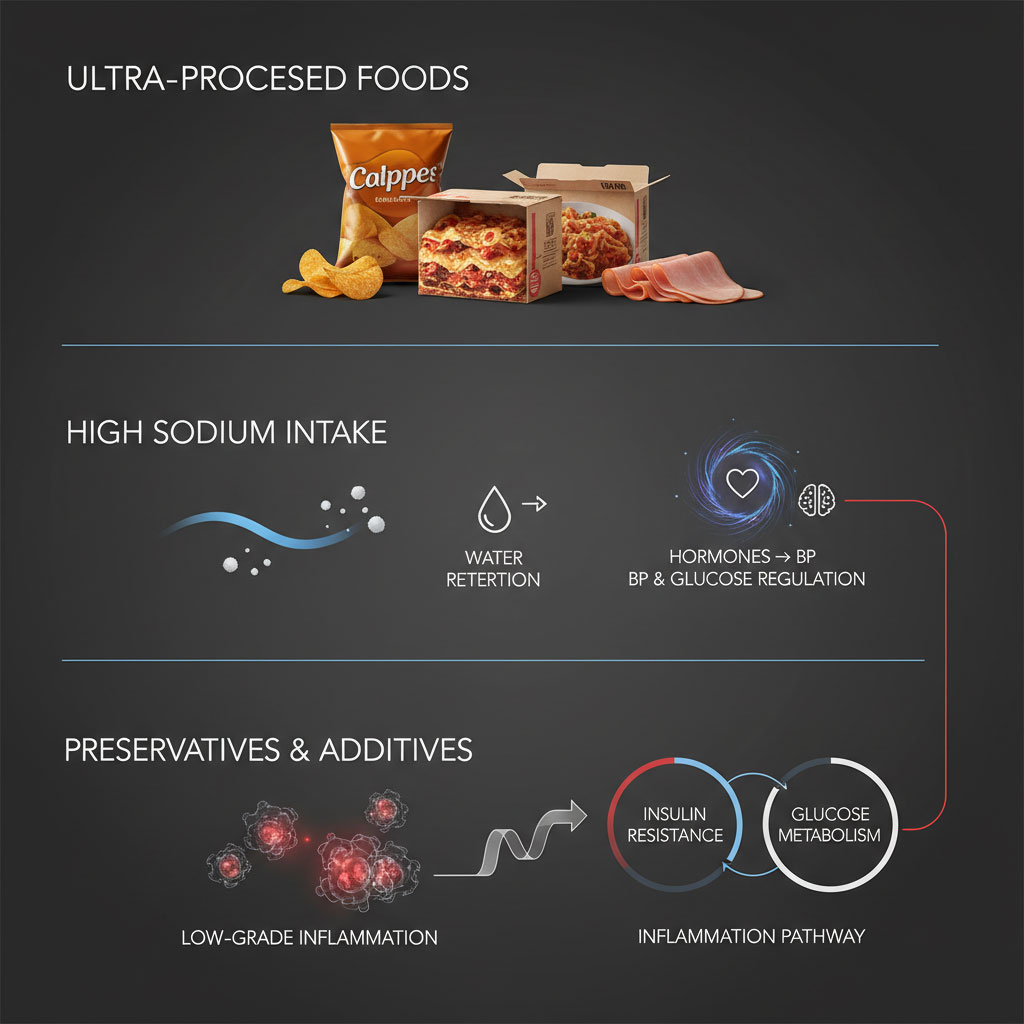
Furthermore, the preservatives and additives in many packaged snacks, frozen dinners, and deli meats can contribute to a low-grade inflammatory response in the body, which has been shown to subtly influence insulin resistance and glucose metabolism.
The Ideal Night-Before-Test Meal: What to Eat for Accurate Results
Now that we have covered the extensive list of fasting blood sugar test foods to avoid, let’s focus on the positive. The goal is to create a healthy dinner before fasting blood sugar test that is satisfying, nutritious, and stabilizing.
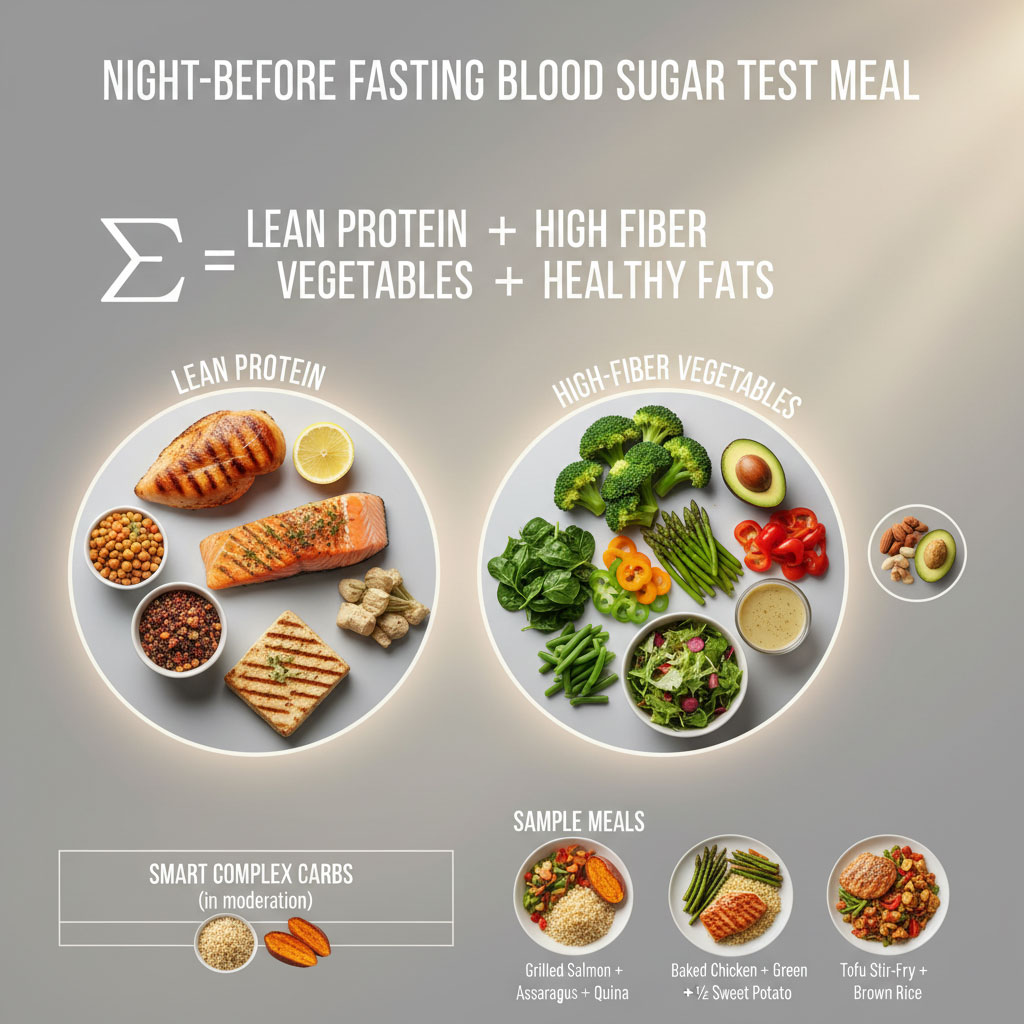
The Formula for Success: Lean Protein + High Fiber + Healthy Fats
A balanced meal before glucose test should be built around a simple formula. This combination of macronutrients is digested slowly and steadily, preventing the dramatic blood sugar spikes and crashes associated with refined carbs and sugar.
- Lean Protein: Promotes satiety, keeping you full overnight, and has a minimal effect on blood sugar.
- High-Fiber Vegetables: Fiber slows down the absorption of carbohydrates, leading to a more gradual rise in blood sugar.
- Healthy Fats: A small amount helps with fullness and has a negligible impact on glucose levels.
Building Your Plate: The Best Dinner Options Before a Fasting Blood Test
Thinking about what should I eat the night before a fasting blood sugar test does not have to be complicated. Stick to whole, unprocessed foods.
- Excellent Lean Protein Choices: Grilled chicken breast, baked or broiled fish (like salmon or cod), tofu, or legumes (like lentils or chickpeas).
- Optimal High-Fiber Vegetables: Focus on non-starchy options. Steamed broccoli, roasted asparagus, sautéed spinach, green beans, bell peppers, or a large salad with a light vinaigrette are all great.
- Smart Complex Carbs (in moderation): A small portion, about the size of your fist or ½ cup cooked, is appropriate. Good choices include quinoa, brown rice, or a small sweet potato.
- Incorporating Healthy Fats: The question of “are nuts safe to eat before blood sugar testing” is common. Yes, a small handful of unsalted almonds or walnuts, or a quarter of an avocado, can be a great addition to your meal.
Sample Meal Plans for Your Pre-Test Dinner
Here are a few simple ideas for the best dinner before fasting blood sugar test:
- Grilled Salmon: A 4-ounce fillet of grilled salmon, a cup of roasted asparagus with a squeeze of lemon, and a half-cup of cooked quinoa.
- Baked Chicken: A baked chicken breast (skinless) with a side of steamed green beans and a small sweet potato.
- Tofu Stir-Fry: Firm tofu stir-fried with broccoli, bell peppers, and snap peas in a low-sodium soy sauce, served with a half-cup of brown rice.
Comparison Table: Building Your Optimal Pre-Test Plate
This table provides a clear visual guide to help you make the right choices for your night before blood glucose test meal.
| Feature | ✅ The Ideal Pre-Test Meal (Eat This) | ❌ The Result-Skewing Meal (Avoid This) |
| Protein Source | Grilled chicken breast, baked fish, tofu, lentils | Fried chicken, fatty steak, bacon, processed deli meats |
| Carbohydrate | ½ cup quinoa, brown rice, or a small sweet potato | Large plate of white pasta, white rice, pizza, or french fries |
| Vegetables | Steamed broccoli, roasted asparagus, large green salad | Corn, peas (in excess), vegetables in creamy or cheesy sauces |
| Fats | Avocado, olive oil dressing, a handful of almonds | Butter, creamy sauces, gravy, mayonnaise-based salads |
| Beverage | Plain Water | Soda, fruit juice, wine, beer, sweetened iced tea |
| Dessert | None | Cake, cookies, ice cream, or sweetened yogurt |
| Overall Effect | Promotes stable blood sugar and clear blood serum. | Causes glucose spikes and potential lipemia. |
Your Pre-Test Timeline: A 24-Hour Countdown to Accurate Results
Proper blood sugar test preparation extends beyond just one meal. Following a simple timeline can help ensure you eliminate all variables and arrive at the lab ready for an accurate test.
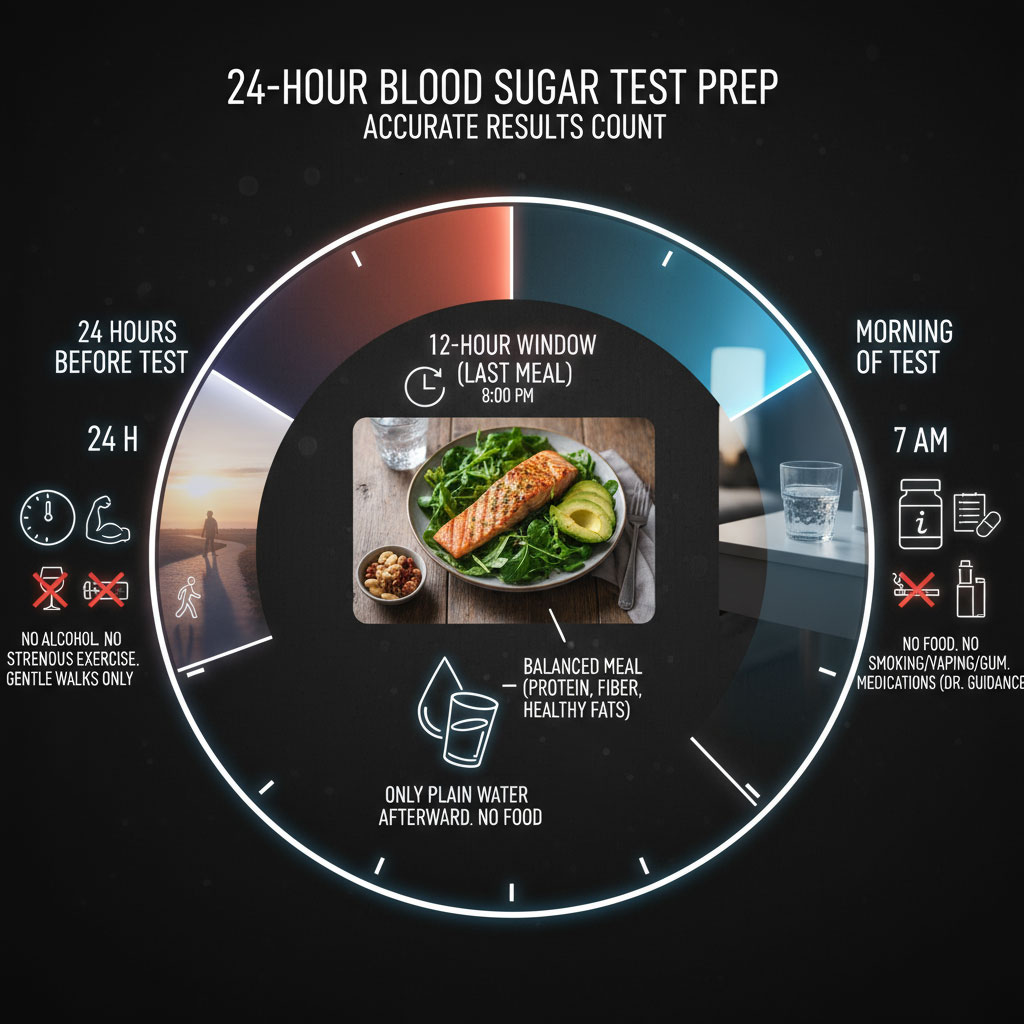
24 Hours Before Your Test
Your preparation should begin a full day before your scheduled blood draw.
- Avoid all alcoholic beverages. The effects of alcohol on your liver and triglycerides can last longer than you think.
- Avoid unusually strenuous exercise. Intense physical activity can impact your insulin sensitivity and glucose levels. A gentle walk is fine.
The 12-Hour Window (Your Last Meal)
This is the most critical phase. If your test is scheduled for 8 AM, you should be finished with all food and drinks (except water) by 8 PM the night before.
- Eat your balanced meal composed of protein, fiber, and healthy fats.
- Double-check your cut-off time and set a reminder.
- After this meal, consume only plain water.
The Morning of Your Test
The final stretch is simple but strict.
- Do not eat or drink anything other than sips of plain water.
- Do not smoke, vape, or chew gum.
- Ask your doctor for instructions regarding your morning medications. Most can be taken with a small amount of water, but some may need to be postponed until after your test.
Beyond Diet: Other Critical Factors That Can Influence Your Blood Sugar Test
While the list of foods to avoid before a blood sugar test is paramount, other physiological factors can influence your results.
Table: Potential Impact of Non-Dietary Factors on Fasting Glucose
| Factor | Potential Impact on Glucose Reading | Mechanism & Recommendation |
| Poor Sleep | Can increase by 5-10 mg/dL | Lack of sleep raises cortisol, which signals the liver to release glucose. Aim for 7-9 hours of quality sleep. |
| High Stress | Can increase by 10-20 mg/dL | Emotional or physical stress elevates cortisol and adrenaline, both of which can raise blood sugar. Practice relaxation techniques. |
| Acute Illness | Can increase by 20+ mg/dL | Your body releases stress hormones to fight infection, which significantly raises glucose. Consider rescheduling if you are sick. |
| Certain Meds | Variable (Increase or Decrease) | Corticosteroids, beta-blockers, and diuretics can raise glucose. Always discuss your medications with your doctor. |
What Happens If I Accidentally Eat or Drink?
Mistakes happen. If you accidentally eat or drink something other than water during your fasting window, the best course of action is honesty.
Call your doctor’s office or the laboratory. They will likely advise you to reschedule your test. It is always better to rebook than to proceed with the test and get an unreliable result that could lead to an incorrect diagnosis.
Summary: Your Action Plan for a Reliable Blood Sugar Test
Navigating your blood sugar test preparation is a straightforward process when you know the rules. By being mindful of your choices, you can provide your healthcare team with the most accurate data possible.
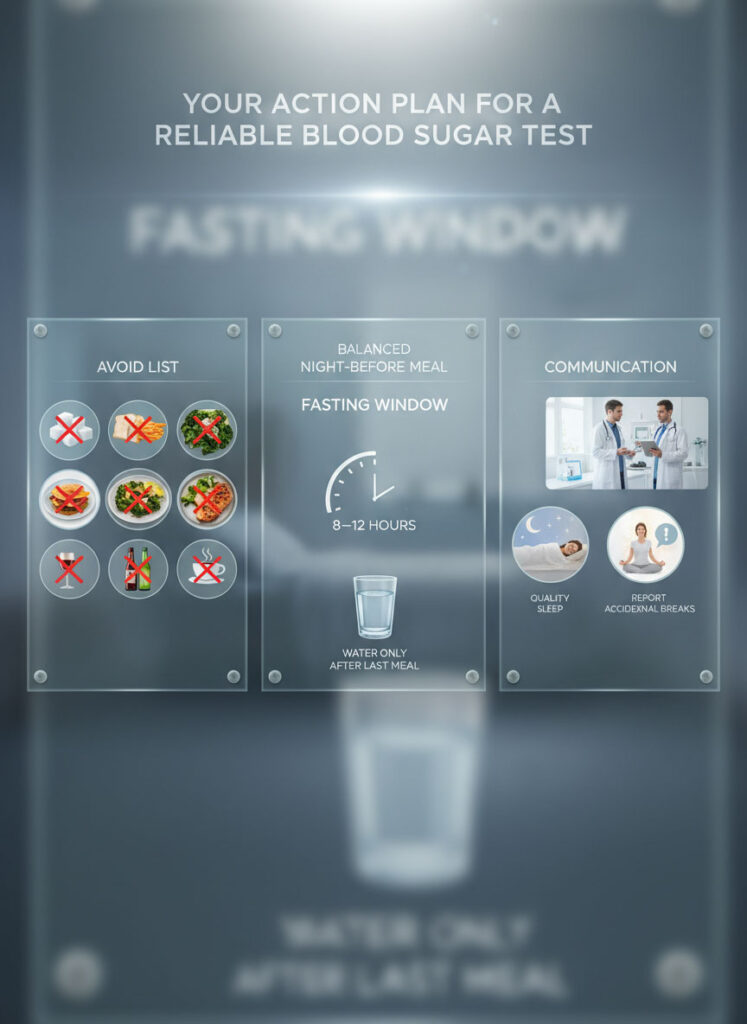
- Remember the “Avoid” List: Steer clear of sugar, refined carbs, high-fat foods, alcohol, and caffeine in your final meal. These are the main fasting blood sugar test foods to avoid.
- Build a Balanced Plate: Your best option for what to eat night before blood sugar test is a meal centered on lean protein, high-fiber vegetables, and a small amount of healthy fat.
- Mind the Clock: Strictly adhere to the 8 to 12-hour fasting window, consuming only water after your last meal.
- Control Other Variables: Do your best to get a good night’s sleep and minimize stress before your test.
- Communicate Openly: Always talk to your doctor about your medications and report any accidental breaks in your fast.
Ultimately, taking these steps is a simple yet powerful way to participate actively in your own healthcare, ensuring that your results paint a true and clear picture of your metabolic health.
Frequently Asked Questions (FAQs)
What is the absolute best thing to eat the night before a blood sugar test?
The best meal is one that stabilizes blood sugar, such as a piece of grilled salmon or chicken, a large serving of non-starchy vegetables like broccoli or a green salad, and a small portion (about ½ cup) of a complex carbohydrate like quinoa.
Can I really not drink black coffee before my fasting test?
That is correct. Even without sugar or cream, the caffeine in coffee can stimulate your body to release stress hormones, which can cause your liver to release stored glucose, potentially elevating your fasting blood sugar level.
Why do high-fat foods matter if they don’t have sugar?
High-fat foods can cause lipemia, a condition where fats in the blood make the serum sample cloudy. This can physically interfere with laboratory equipment and make it impossible to get an accurate reading for glucose and other markers like cholesterol.
Is it okay to have a handful of nuts or a piece of fruit before fasting begins?
A small handful of plain nuts as part of your balanced evening meal is perfectly fine. However, you should avoid fruit as a standalone snack right before your fast begins, as its natural sugars can still cause a glucose spike.
How long does alcohol affect blood sugar test results?
The effects of alcohol on liver function and triglyceride levels can last for up to 24 hours. For this reason, it is strongly recommended to avoid all alcoholic beverages for at least one full day before your scheduled blood draw.
Can I drink water while fasting for a blood test?
Yes, absolutely. Drinking plain water is encouraged during your fast. It keeps you hydrated and does not affect your blood glucose levels. Avoid any flavored waters or beverages with sweeteners.
If my test is in the afternoon, when should I start fasting?
You need to count back 8 to 12 hours from your appointment time. For example, if your test is at 2 PM, you should have your last meal finished by 6 AM at the latest, and ideally by 2 AM.
Will being nervous or stressed on the day of the test affect my results?
Yes, it can. Stress and anxiety cause your body to release cortisol, a hormone that can raise your blood sugar. Try to remain as calm as possible on the morning of your test. Practice deep breathing if you feel anxious.
What should I do if I forget and have a piece of toast for breakfast?
You should call your doctor’s office or the lab immediately. Do not proceed with the test. They will instruct you to reschedule, as the toast will invalidate the fasting results.
Are there different fasting rules for a lipid panel vs. a glucose test?
The rules are largely the same, as both tests are often done from the same blood sample and are affected by the same foods. High-fat meals are particularly disruptive to lipid panels, just as sugary foods are to glucose tests.
Do I need to avoid high-fiber foods?
No, high fiber foods before a blood test, especially from non-starchy vegetables, are beneficial. Fiber helps slow digestion and stabilize blood sugar, making it an ideal component of your last meal before a fast.
Can my normal daily supplements affect my fasting blood sugar?
Some supplements, such as fish oil in large doses or certain vitamins like niacin, can affect blood sugar or lipid levels. It is best to ask your doctor if you should postpone your daily supplements until after your blood draw.

